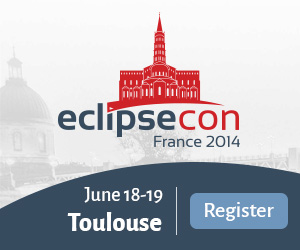|
Eclipse Modeling - Yours to discover
There are many model-based development technologies within the Eclipse community. There's always something new and exciting going on and this month's newsletter highlights a few of them.
Featured below you fill find an EMF Forms tutorial, a comparison between view modeling and manual UI programming, an introduction to Oomph and an article about GMF.
Don't forget to register for EclipseCon France, taking place June 18-19 in Toulouse. Why not also sign-up for the Eclipse Working Groups Unconference on June 17.
See you in France!
Roxanne
Editor
@roxannejoncas
|




Sven Efftinge
itemis
What do you do?
I work as a development and branch manager for itemis, a strategic member at Eclipse. I'm in a lucky position as I work with a very skilled and
friendly team on Eclipse Xtext and Eclipse Xtend. Xtext is a framework for development of programming languages including Eclipse Support, while
Xtend is a modern functional language we have built with it, that translates to Java source code. When I'm not working on new features and other improvements in these open-source
projects, I often help customers using these technologies or talk about the technologies at conferences. It's the best job I could possibly find.
The rest of my life is
dedicated to travelling, music, good food and my family. I'm also obsessed with kiteboarding.
How long have you been using Eclipse?
I switched from Netbeans a couple of months after Eclipse was first made available. I think it was 2002. I built my first
plug-in in 2003. It was a text editor for a template language (the first version of Xpand, in case anybody knows it).
Name three plugins you use and recommend:
- JDT - Java Development Tools: Every Java developer uses JDT of course, at least when Eclipse is the IDE of choice. I list it here
to emphasize how good it actually is. A lot of complaints are being made about Eclipse in general, but in fact the platform plug-ins like JDT are rarely the problem. JDT is fast and
reliable and one of the best programming language tools on the planet.
- Oomph: Oomph is a new project at eclipse which automates the setup of a developer's environment. Whenever someone
enters a new team and project, people usually start the first two days setting up everything. With a proper Oomph configuration it's one click. You can share workspace settings within
your team and it updates your local installation automatically. Very helpful for any kind of project, but especially for open-source projects. If you want to get contributions make it easy to get started.
I can only recommend to try it.
- FindBugs: FindBugs can be a helpful guide when used properly. I don't use it on a regular basis, but I tend to look at it before releases.
Of course, I use the tools we build a lot. "Eat your own dog food" is an important principle for me.
What's your favorite thing to do when you're not working?
At the moment that is definitely kiteboarding. It's just so nice to get out on the water - just me and the wind.
With kiteboarding it seems like the learning curve never ends, I learn so much every time I get out and I get into the flow immediately.
I think of nothing else when I'm doing it. There's a reason everyone who tried it is addicted.
I live directly on the coast and the next spot is just 20 minutes from the office. :-)
|
|
|



IoT Day
June 3, 2014
Ottawa, Canada
|
Eclipse Integrated Development Day
June 3, 2014
Berlin, Germany
|
Eclipse Day Montreal
June 10, 2014
Montreal, Canada
|
Eclipse Working Groups Unconference
June 17, 2014
Toulouse, France
|
EclipseCon France
June 18-19, 2014
Toulouse, France
|
|







